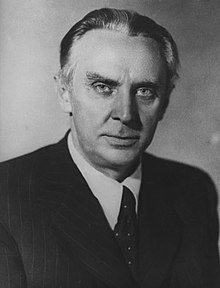| Konstantin Fedin | |
|---|---|
 Fedin, c. 1949 Fedin, c. 1949 | |
| Born | Konstantin Aleksandrovich Fedin (1892-02-24)24 February 1892 Saratov, Russian Empire |
| Died | 15 July 1977(1977-07-15) (aged 85) Moscow, Soviet Union |
| Occupation | Poet, novelist |
| Period | 1922–1977 |
| Genre | Fiction, poetry |
| Literary movement | Socialist realism |
| Notable works | Cities and Years |
Konstantin Aleksandrovich Fedin (Russian: Константи́н Алекса́ндрович Фе́дин, IPA: [kənstɐnʲˈtʲin ɐlʲɪkˈsandrəvʲɪtɕ ˈfʲedʲɪn] ; 24 February [O.S. 12 February] 1892 – 15 July 1977) was a Soviet and Russian novelist and literary functionary.
Biography
Born in Saratov, Fedin studied in Moscow and Germany and was interned there during World War I. After his release, he worked as an interpreter in the first Soviet embassy in Berlin. On returning to Russia, he joined the Bolsheviks and served in the Red Army. After leaving the Party in 1921, he joined the literary group called the Serapion Brothers, who supported the Revolution, but wanted freedom for literature and the arts.

His first story, "The Orchard", was published in 1922, as was his play Bakunin v Drezdene (Bakunin in Dresden). His first two novels were Goroda i gody (1924; tr. as Cities and Years, 1962, "one of the first major novels in Soviet literature") and Bratya (Brothers, 1928). Both deal with the problems of intellectuals at the time of the October Revolution, and include "impressions of the German bourgeois world" based on his wartime imprisonment.
His later novels include Pokhishchenie Evropy (The rape of Europe, 1935), Sanatorii Arktur (The Arktur sanatorium, 1939), and the historical trilogy, Pervye radosti (First joys, 1945), Neobyknovennoe leto (An unusual summer, 1948), and Kostyor (The Fire, 1961–67). He also wrote a memoir Gorky sredi nas (Gorky among us, 1943). Edward J. Brown sums him up as follows: "Fedin, while he is probably not a great writer, did possess in a high degree the talent for communicating the atmosphere of a particular time and place. His best writing is reminiscent re-creation of his own experiences, and his memory is able to select and retain sensuous elements of long-past scenes which render their telling a rich experience."
From 1959 until his death in 1977, he served as chair of the Union of Soviet Writers.
Awards
- Hero of Socialist Labour (1967)
- Four Orders of Lenin
- Order of the Red Banner of Labour, twice
- Order of the October Revolution
- Stalin Prize, 1st class (1949) – for the novel "First Joy" (1945) and "No Ordinary Summer" (1947–1948)
English Translations
- No Ordinary Summer, 2 vols, Foreign Languages Publishing House, Moscow, 1950.
- Sanatorium Arktur, Foreign Languages Publishing House, Moscow, 1957.
- Early Joys, Vintage, 1960.
- The Conflagration, Progress Publishers, Moscow, 1968.
- Cities and Years, Northwestern University Press, 1993.
References
- R.D.B. Thompson in A.K. Thorlby (ed.), The Penguin Companion to Literature: European (Penguin, 1969), p. 264.
- Alexandra Smith in Neil Cornwell and Nicole Christian (ed.), Reference Guide to Russian Literature (Taylor & Francis, 1998: ISBN 1-884964-10-9), p. 300.
- Hongor Oulanoff in Victor Terras (ed.), Handbook of Russian Literature (Yale University Press, 1990:ISBN 0-300-04868-8), p. 134.
- Edward J. Brown, Russian Literature Since the Revolution (Harvard University Press, 1982: ISBN 0-674-78203-8), p. 95.
- Brown, Russian Literature Since the Revolution, p. 100.
Sources
- Encyclopædia Britannica
- A.K. Thorlby (ed.), The Penguin Companion to Literature: European (Penguin, 1969).
External links
Categories:- 1892 births
- 1977 deaths
- 20th-century Russian male writers
- Bolsheviks
- Burials at Novodevichy Cemetery
- Eighth convocation members of the Supreme Soviet of the Soviet Union
- Full Members of the USSR Academy of Sciences
- Heroes of Socialist Labour
- Ninth convocation members of the Supreme Soviet of the Soviet Union
- Writers from Saratov
- Recipients of the Order of Lenin
- Recipients of the Order of the Red Banner of Labour
- Recipients of the Patriotic Order of Merit in gold
- Russian male novelists
- Russian male poets
- Russian male short story writers
- Seventh convocation members of the Supreme Soviet of the Soviet Union
- Sixth convocation members of the Supreme Soviet of the Soviet Union
- Soviet male writers
- Soviet novelists
- Soviet poets
- Soviet short story writers
- Recipients of the Stalin Prize